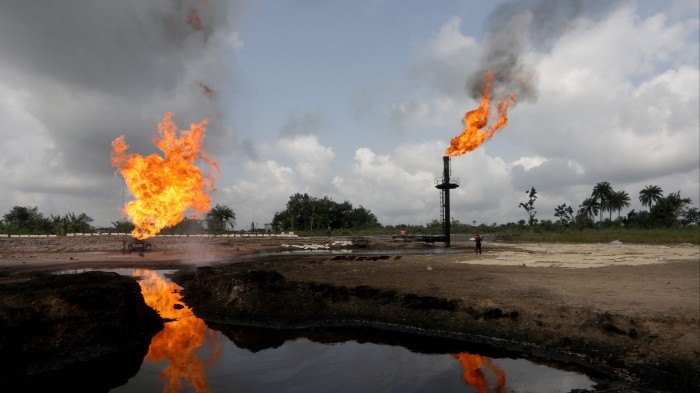Unlock the Editor’s Digest for free
Roula Khalaf, Editor of the FT, selects her favourite stories in this weekly newsletter.
A spate of unexplained blazes and explosions at oil and gas pipelines in Nigeria’s oil-rich Niger Delta is threatening the country’s oil production and has spiralled into a national political dispute.
At least three fires and blasts on oil and gas pipelines have been reported in Africa’s largest oil producer over the past week, with President Bola Tinubu last week imposing emergency rule in the Delta’s Rivers State, citing political dysfunction and attacks on oil installations.
Tinubu suspended the state governor Siminalayi Fubara — a member of the main opposition party — his deputy and state lawmakers, appointing a retired vice-admiral of the Nigerian Navy as interim administrator.
The perpetrators of the attacks have not been identified, but the Niger Delta’s production has long been plagued by militant attacks on pipelines and oil infrastructure.
Rivers has also had a history of political violence, with officials accused of deploying thugs to attack pipelines — and each other — during disputes.
Tinubu came to power in 2023 vowing to crack down and improve security in order to boost Nigeria’s oil production.
Output has steadily increased during his time in office, rising to at least 1.4mn barrels a day this year from historic lows of less than 1mn under his predecessor Muhammadu Buhari. Tinubu has said he wants to boost this to 2mn b/d.
With oil and gas exports accounting for about half of Nigeria’s government budget and more than 80 per cent of its foreign exchange receipts, a sustained period of vandalism would wreak havoc on government finances.
Tinubu has linked the pipeline vandalism to the ongoing political crisis in Rivers, saying security reports showed “disturbing incidents of vandalisation of pipelines by some militant without the governor taking any action to curtail them”. Fubara, the suspended governor, has denied any association with militant groups.
But critics have accused Tinubu of using the declaration of a state of emergency as a pretext for a politically motivated power grab that could spell trouble for Nigeria’s democracy by drastically expanding the president’s powers.
Celestine Akpobari, a civil society activist in Rivers, called Tinubu’s actions an “attack on federalism and democracy”.
“You don’t use a sledgehammer to kill a mosquito that perches on your scrotum,” Akpobari said. “That’s what has happened here. That is executive recklessness.”
Prominent Nigerians including former President Goodluck Jonathan and Nobel laureate Wole Soyinka have decried Tinubu’s emergency declaration. It is only the third time since Nigeria’s return to democracy in 1999 in which a state of emergency has been used to suspend a state’s elected legislature.
“We are casually getting rid of the entire state government and overriding the will of the electorate,” said Dele Olojede, a Nigerian journalist and Pulitzer Prize winner.

A segment of the Trans Niger Pipeline, which is responsible for approximately 15 per cent of the country’s crude exports, caught fire last week, with smoke billowing from the facility.
Operations were fully restored at the pipeline, which has a maximum capacity of 450,000 barrels of crude a day, on Tuesday after about a week of disruption.
The TNP was operated by Shell until earlier this month when it was transferred to local consortium Renaissance Africa Energy Company as part of the multinational’s divestment from Nigeria’s onshore oil industry.
The Nigeria Police Force said it was investigating the TNP fire, saying it has taken two people into custody.
The political crisis in Rivers broke out soon after Fubara was sworn into office as governor in May 2023, after falling out with his predecessor and Tinubu’s ally Nyesom Wike.
Last month Nigeria’s Supreme Court ruled that there was “no government” in Rivers as Fubara governed without a full-strength state legislature, as dozens remained loyal to his estranged godfather Wike.
“The president’s action was illegal,” said Cheta Nwanze, partner at the Lagos-based SBM Intelligence company, adding that the fact that pipeline fires had continued after the state of emergency meant “the excuse he gave has been rendered hollow”.
Additional reporting by David Pilling in London; data visualisation and cartography by Steven Bernard




